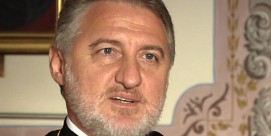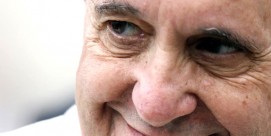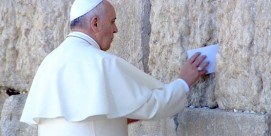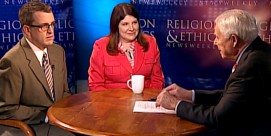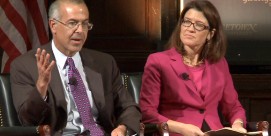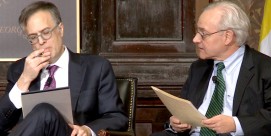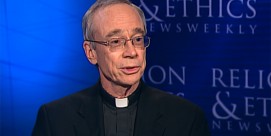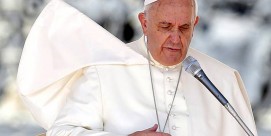KIM LAWTON, correspondent: This is St. Maria’s Meals, a project of Catholic Charities in the Archdiocese of Washington, D.C. Every week, St. Maria’s Meals feeds an average of 300 people on the street. Most of them are homeless. Immediately after addressing a joint session of Congress next Thursday (September 24), Pope Francis will come here, to meet with Catholic Charities clients and see St. Maria’s Meals in action.
REV. JOHN ENZLER (Catholic Charities, Washington, D.C.): This is who he is. He is a man of the poor. He’s going to go to the most powerful place maybe in our country, Congress, and he’s going to leave there, and before he leaves the city, he’s going to say, "Let me go back with my people."
LAWTON: In all his foreign trips, in addition to meeting with state dignitaries and religious leaders, Francis has made it a point to schedule significant time to visit poor and marginalized people. Here in the U.S., he’ll also be visiting immigrant families and prisoners.
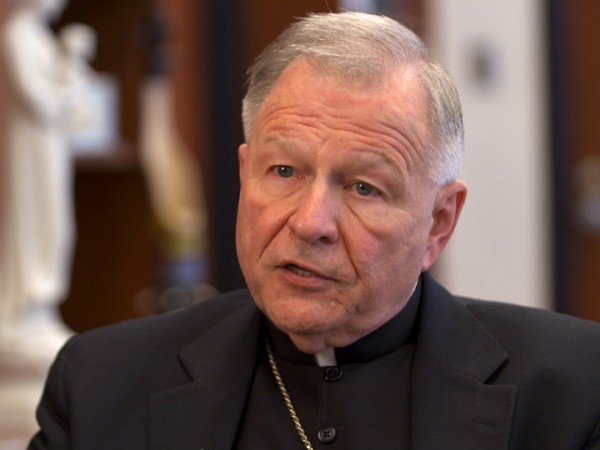
ARCHBISHOP GREGORY AYMOND (Archdiocese of New Orleans): Why does he do that? It’s what we find in the Scriptures consistently. In the Old Testament is always God sending the prophets and speaking a voice for the orphans, the widows, those who are poor, those who are disenfranchised. In the New Testament we find that Jesus not only does that, but he says as long as you do it for one of the least of my brothers or sisters, you have done it for me.
LAWTON: John Carr is director of the Initiative on Catholic Social Thought and Public Life at Georgetown University. He says Francis is simply living out his faith.
JOHN CARR (Georgetown University): In some ways, the most powerful thing about his message is not what he says, but what he does and who he meets with. He is a walking talking parable.
LAWTON: Francis’ actions and several of his recent high-profile statements on controversial issues have led some observers to characterize him as “political” and “radical.” But many U.S. Catholic leaders argue that it would be a mistake to view Francis solely through a political lens. They say Francis is embodying foundational Roman Catholic beliefs, beliefs that come from the Scriptures and from the Church’s social teaching. Father John Enzler, director of Catholic Charities in D.C., says the pope’s emphasis on poor people, immigrants, and refugees flows directly from the major principles outlined in Catholic teaching about achieving social justice.
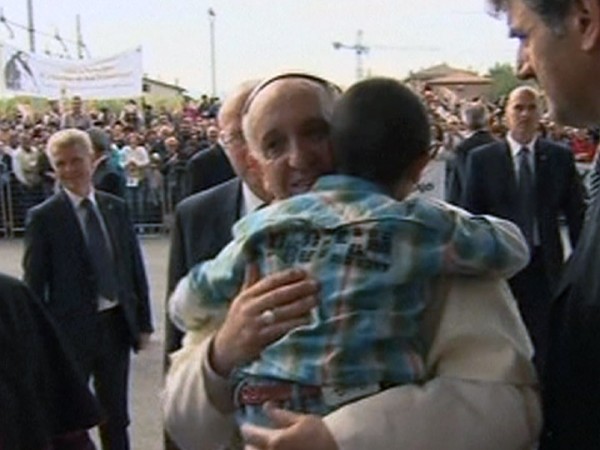
ENZLER: You give a preferential option to the poor. They have a preference. I will tell you I don’t think I live that so well. The pope seems to say, "Let’s work on that, get out into the streets, let’s work on that, let’s make a difference."
CARR: Catholic social thought begins with the life and dignity of the human person.
LAWTON: Carr says that concern for people was evident in Francis’ recent encyclical on the environment.
CARR: We treat people as things, we treat creation as something we can exploit, and he comes with a different message, that every person is precious, and that the environment, climate, the earth is a gift, not something to exploit.
LAWTON: Catholic analysts affirm the beliefs that undergird Francis’ actions are no different than those of his predecessors.
ASHLEY MCGUIRE (The Catholic Association): He’s getting the message of the Catholic Church back to its most basic roots.
LAWTON: But what is different is the perspective he brings from his own background and experience.
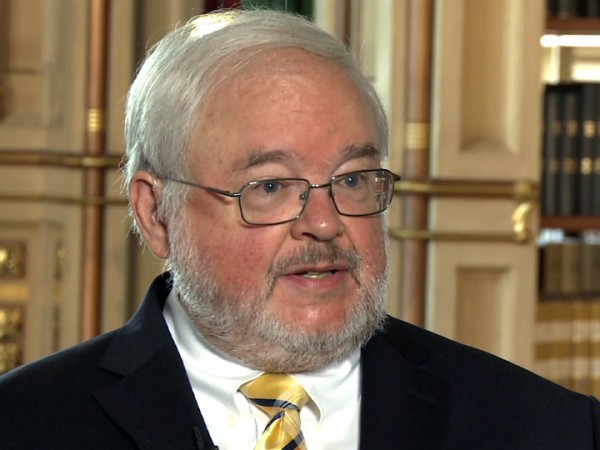
CARR: His ministry was not in Poland, a Communist country, like John Paul II. He did not do his work in the university or in the Vatican like Pope Benedict. He was a pastor in a third-world country. He’s the grandson of immigrants. So he brings a different view. While the message is the same, the urgency, the priority is different.
LAWTON: Some Catholics—including some high-ranking Catholics—disagree with how Francis has been applying church teachings. Several U.S. conservatives have raised concerns about the pope’s recent economic statements, especially his criticism of "unfettered capitalism." When asked about the controversy, Francis said he wanted to read up on it more before his U.S. trip. New Orleans Archbishop Gregory Aymond says Francis’ economic views are based on the Church teaching that every person deserves opportunities for a good quality of life.
AYMOND: There is an unfair distribution in the world of the riches and the goods of the world, and he’s calling us to task and saying, how do we distribute this differently? And that’s a valid question, certainly for us in the United States, and in many, many other countries, that it’s a very small number of people who own everything and control everything, and very often the poor are not really considered.
LAWTON: Aymond doesn’t see Francis backing away from that.
AYMOND: The message is not popular, but it’s a message that comes from the Scriptures. It’s a message he believes in, and I don’t think that there’s any possibility that he’s going let go of that.
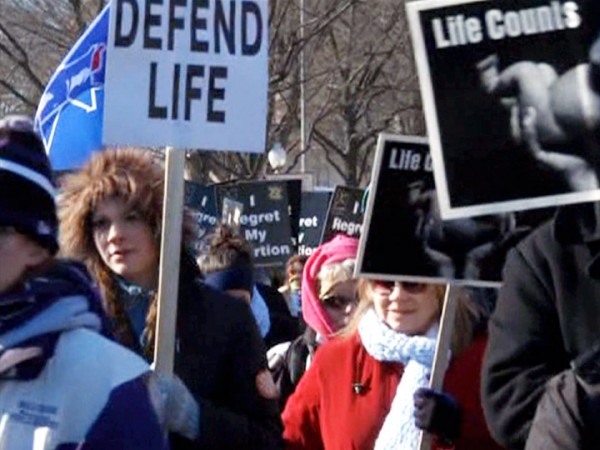
LAWTON: Many American Catholics will also be watching to see how Francis addresses controversial social issues like gay marriage and abortion. Some conservatives are disappointed that he hasn’t been more outspoken about them. Carr says once again Francis has a different approach.
CARR: The best way to describe Pope Francis’ efforts around human life, around the family is: no obsession. It’s not the only thing he cares about. But no retreat. He says he’s a child of the Church.
AYMOND: He’s a welcoming spirit and says that we as Church need to open our hearts and our lives to all people. Sometimes people misunderstand that and say, well, that means we have to compromise who we are or what we believe in, and we don’t. We are Catholics and we believe in the Scriptures. We believe in the Catholic teaching.
LAWTON: According to McGuire of the Catholic Association, the life issues are part of Francis’ comprehensive view of human dignity.
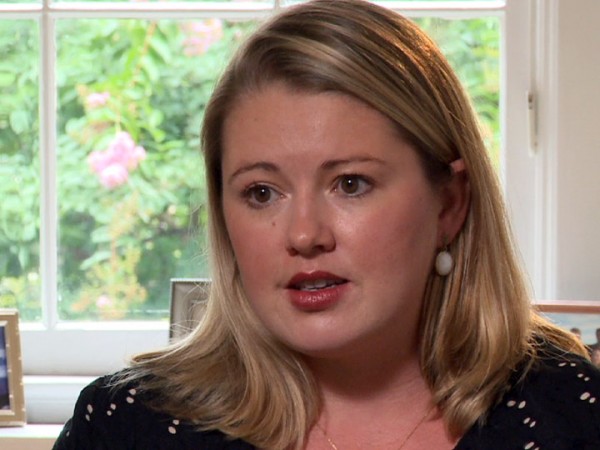
MCGUIRE: In the same breath, same sentence, almost every single time he brings up the issue, he talks about the unborn, the elderly, the poor and the disabled, and so he’s talking about the margins of society, and that these are all people who are marginalized in different ways.
LAWTON: Carr says like Catholic social teaching itself, Francis doesn’t fall into neat political categories.
CARR: He will make everyone uncomfortable if you listen to him carefully. I can’t wait to see him in front of the Congress. I think there will be moments when everyone feels affirmed and everyone feels challenged. So for him this is not an ideology. This is the Gospel at work.
LAWTON: McGuire says younger Catholics especially resonate with Francis’ call to meet people where they are.
MCGUIRE: People grew up in broken homes. Probably all of us know somebody who’s had an abortion. We all have gay friends. And so I think his message is to literally walk alongside those people and I think that’s something millennials get. Because we know that often the best way to bring the joy of the Gospel, the message of Christianity to people is to be their friend.
LAWTON: Aymond says on issues from the environment to poverty, Francis is challenging all Catholics, including him, to be more intentional about living out their beliefs.
AYMOND: When I saw all that he was doing I must admit that I had to do, I had to look into my own conscience and say, "Am I spending enough time with the poor, the prisoners, the street people? Do they have a priority in my ministry?" His example speaks loudly.
LAWTON: And given the excitement surrounding his visit, that example will be front and center well beyond the coming week. I’m Kim Lawton reporting.
BOB ABERNETHY, host: We want to follow Kim’s story with more on the messages Pope Francis could bring. Kim is here, and so is Tom Roberts, a former editor and now editor-at-large of National Catholic Reporter. Also, Stephen Schneck is director of the Institute for Policy Research and Catholic Studies at the Catholic University of America. Welcome to you all.
Steve, what do you think the pope wants to accomplish? What is at the top of his agenda, in answer to the question why is he coming?
STEPHEN SCHNECK (Catholic University of America): Well, I think first of all he’s coming as a pastor, and we can’t forget that. But I suspect what he’ll do when he’s here is he’s going to use the occasion to prick the American conscience. I think that he’s going to reach out and try to call America to realize that with all of our blessings come responsibilities. I think that he’s going to call us to recognize the moral dimension of those responsibilities.
ABERNETHY: On any specific issues? Yes, a lot of specific issues.
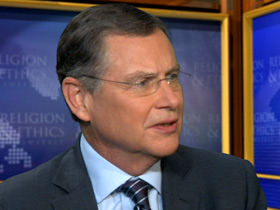
SCHNECK: A lot of specific issues. So, for example, I’m sure he’ll be talking about immigration at all three of the venues. I think that he’ll be talking about care for creation. I also expect him to talk about life issues, and as well he’ll be talking about poverty, about mass incarceration. I mean the range of issues is actually quite large.
ABERNETHY: Kim?
KIM LAWTON, managing editor: We’re in this interesting situation where he’s coming as a pastor, but so much, especially in Washington, are these political spots. And we have the situation where a few years ago Americans were uncomfortable with a Catholic president because they thought the pope would be too influential. Now we’re begging to have him speak to the joint sessions of Congress. Is there a danger, Tom, that there may be some political exploitation going on here?
TOM ROBERTS (National Catholic Reporter): Well, I don’t think there’s the danger of that happening on the pope’s part. He’s speaking very bluntly, and he was invited, and there he is. I think that it would be dangerous for either party to try to play politics off of what he says. But he brings a really I think interesting newness to the religious conversation, especially as politics goes, because he’s making a lot of Americans uncomfortable. He talks about global economics in very blunt ways and from the perspective of the poor, and he here is in the seat of the global center, global central. And I think that he’s going to unsettle people on all sides of the issues.
SCHNECK: Absolutely.
ABERNETHY: And you have said, Tom that he sees the whole world from a perspective different from that that most of the rest of us have.
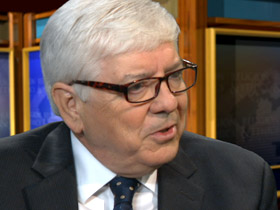
ROBERTS: I think so, especially as a pope. He doesn’t come from Germany or Poland. He doesn’t come from the academy. He wasn’t part of the curia in Rome. And I think you can’t overstate how influential his years in the slums of Buenos Aires has been as a formation for this. That’s what he knew. They’re the Catholics he knew. So they weren’t scrubbed-up families going to mass every Sunday morning. He ran into broken lives, and he saw the results of poverty and marginalization and also the results of global economics on the poorest. So that’s his lens, and he understands the world that way. I think that’s a powerful motivator for him.
ABERNETHY: Yes.
LAWTON: But how does that challenge him, then, coming to an audience here, where there are scrubbed-up Catholics going to mass on Sunday? You know, what is his challenge speaking to an American audience?
SCHNECK: You know, I think, Kim, what he’s trying to do is wake those scrubbed-up Catholics up. Wake them up to recognize that there are people on the margins, and that in fact we’re called as Christians to look at our life and to understand our world from the perspective of those margins. I think that’s why he’s so powerful, and I think that’s why his charisma is just so magical.
ROBERTS: I’m sorry, I heard it said, there’s a nice way to put it, that the words are the same, but the music’s changed. And in a sense that’s true, but more than that. I mean he’s changed the optics, if you will, of what it means to be a pope. So the statements about poverty are all over our papal documents for a long, long time. But—
SCHNECK: And the Gospels.
ROBERTS: And the Gospels, right. So he’s speaking out of the heart of the gospel, but it’s tough to talk about the poor from a place called “the papal palace.” And he’s just changed that in his actions. He’s got authenticity on his side.
ABERNETHY: Steve, is there a danger here that we’re expecting too much of the pope? Are things really going to change because he’s come?
SCHNECK: You know, in the last couple of days I’ve actually started to have a little bit of that worry, that the—here in Washington, the frothiness about the papal visit is just astonishing. We were talking actually before we came on camera about how hard it is to get tickets to you know, many of these events. So I am a little bit worried that maybe we are setting our expectations awfully high. But on the other hand, I’m utterly convinced of the authenticity of this pope, and I think that if anybody can be a catalyst for the transformation of the world’s soul, I think that it’s this person.
ABERNETHY: Kim, in your piece you spoke with someone who said that what he or she was going to be looking for was more what he did on his private visits to Catholic Charities, to a prison, that sort of thing – than to what he’s going to be saying to Congress and the U.N.
LAWTON: I’ve heard that over and over again, that he speaks loudest through what he does, through these gestures. And people talked about John Paul II, of being that master on stage. But Francis really seems to be master of the gesture. I’m not saying that that’s not authentic for him, but just these actions that he takes and especially with real people, with disadvantaged people – I think being in a visual world, we see those images, and those images carry power and they seem to really be touching people.
SCHNECK: If I could just emphasize how authentic that is. When you see this pope interacting with everyday people, particularly with people on the margins – and I’d love, for example, to be at his visit to Catholic Charities here in Washington or to the prison in Philadelphia. But when you see him in those situations, I mean he’s just almost aglow. It is really a spiritual experience when you see this man in those situations. So yeah, I think he is master of the gesture, but I think that’s all genuinely authentic all the way down.
ABERNETHY: Quickly, what would you like to – where would you like to be when he’s here?
LAWTON: Where are you going to be able to get to?
ROBERTS: Well, I’m told I’m going to be able to be at St. Matthew’s Cathedral when he meets with the U.S. bishops. But I think I’d like to be at Catholic Charities or in the prison, because I think that you don’t fake what he’s doing in those circumstances. And that’s, I think, where the authenticity really rings true.
ABERNETHY: I’m afraid our time is up. Our thanks to Kim Lawton, the managing editor of this program, to Stephen Schneck of Catholic University, and to Tom Roberts of the National Catholic Reporter.








